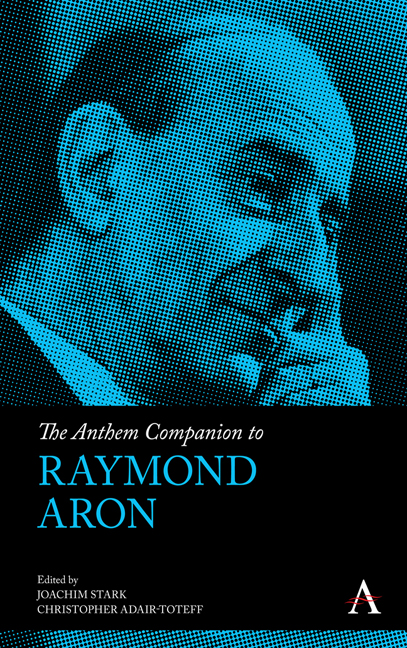Book contents
- Frontmatter
- Contents
- Acknowledgements
- Introduction: Retracing Aron’s Routes to Sociology
- Chapter One The Subject, Pluralism and Équité: Raymond Aron and Sociology
- Chapter Two Aron, Weber and Nationalism
- Chapter Three Equivocal and Inexhaustible: Aron, Marx and Marxism
- Chapter Four The Opium of the Intellectuals
- Chapter Five A New Era in the Human Adventure: Industrial Society and Economic Growth
- Chapter Six Raymond Aron: La lutte de classes
- Chapter Seven Political Philosophy Meets Political Sociology: Raymond Aron on Democracy and Totalitarianism
- Chapter Eight The Contradictions of Prometheus: Wisdom and Action after the Disillusionment of Progress
- Chapter Nine The International Problem and the Question of the Best Political Regime
- Chapter Ten War and Irrationality: Aron and Pareto
- Conclusion: Aron on Liberty
- Notes on Contributors
- Index
Chapter Four - The Opium of the Intellectuals
Published online by Cambridge University Press: 22 February 2022
- Frontmatter
- Contents
- Acknowledgements
- Introduction: Retracing Aron’s Routes to Sociology
- Chapter One The Subject, Pluralism and Équité: Raymond Aron and Sociology
- Chapter Two Aron, Weber and Nationalism
- Chapter Three Equivocal and Inexhaustible: Aron, Marx and Marxism
- Chapter Four The Opium of the Intellectuals
- Chapter Five A New Era in the Human Adventure: Industrial Society and Economic Growth
- Chapter Six Raymond Aron: La lutte de classes
- Chapter Seven Political Philosophy Meets Political Sociology: Raymond Aron on Democracy and Totalitarianism
- Chapter Eight The Contradictions of Prometheus: Wisdom and Action after the Disillusionment of Progress
- Chapter Nine The International Problem and the Question of the Best Political Regime
- Chapter Ten War and Irrationality: Aron and Pareto
- Conclusion: Aron on Liberty
- Notes on Contributors
- Index
Summary
To say that one had “seen the light” is a poor description of the mental rapture which only the convert knows (regardless of what faith he has been converted to). The new light seems to pour from all directions across the skull; the whole universe falls into pattern like the stray pieces of a jigsaw puzzle assembled by magic at one stroke. There is now an answer to every question, doubts and conflicts are a matter of the tortured past—a past already remote, when one had lived in dismal ignorance in the tasteless, colorless world of those who don't know. Nothing henceforth, can disturb the convert's inner peace and serenity—except the occasional fear of losing faith again, losing thereby what alone makes life worth living, and falling back into the outer darkness, where there is wailing and gnashing of teeth.
(Koestler 2001, 23; original emphasis)My conversion is like a faith. My whole being is bent towards one single goal, all my thoughts—even involuntary—lead me back to it. In the deplorable state of distress of the modern world, the plan of the Soviet Union seems to me to point to salvation.
(Gide 1949, 173)When I was a Marxist, I did not hold my opinions as a matter of faith, but I did have the conviction that a sort of unified field theory might have been discovered. The concept of historical and dialectical materialism was not an absolute, and it did not have any supernatural element, but it did have its messianic element in the idea that an ultimate moment might arrive, and it most certainly had its martyrs and saints and doctrinaires and (after a while) its mutually excommunicating rival papacies. It also had its schisms and inquisitions and heresy hunts. I was a member of a dissident sect, which admired Rosa Luxemburg and Leon Trotsky, and I can say definitely that we also had our prophets […] Those of us who had a sort of rational alternative for religion had reached a terminus which was comparably dogmatic.
(Hitchens 2007, 151)Prologue
That The Opium of the Intellectuals is Aron's most well-known book does not mean that it is correspondingly Aron's most read book or indeed his best.
- Type
- Chapter
- Information
- The Anthem Companion to Raymond Aron , pp. 71 - 88Publisher: Anthem PressPrint publication year: 2021

